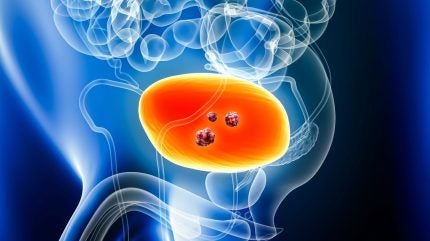
The European Commission (EC) has approved Johnson & Johnson company Janssen-Cilag International’s BALVERSA (erdafitinib) as a treatment for adults with unresectable or metastatic urothelial carcinoma (mUC).
This once-daily oral monotherapy is intended for patients with mUC harbouring susceptible FGFR3 genetic alterations, who have previously undergone a minimum of one line of therapy including a PD-1 or PD-L1 inhibitor.

Discover B2B Marketing That Performs
Combine business intelligence and editorial excellence to reach engaged professionals across 36 leading media platforms.
Erdafitinib, a pan-fibroblast growth factor receptor (FGFR) tyrosine kinase inhibitor, received approval based on data from the Cohort 1 of the Phase III THOR clinical trial.
This trial assessed the efficacy and safety of erdafitinib versus chemotherapy.
In June last year, the THOR study was halted early due to its interim efficacy analysis, as recommended by the independent data safety monitoring committee.
Patients initially randomised to chemotherapy were subsequently offered erdafitinib as crossover therapy.

US Tariffs are shifting - will you react or anticipate?
Don’t let policy changes catch you off guard. Stay proactive with real-time data and expert analysis.
By GlobalDataThe study demonstrated that patients treated with erdafitinib had a median overall survival (OS) of over one year at the data cut-off, a significant improvement compared to the chemotherapy arm.
The treatment also showed a median progression-free survival (PFS) of 5.6 months versus 2.7 months for chemotherapy, and a confirmed overall response rate (ORR) of 35.3% versus 8.5%.
Serious treatment-related adverse events (TRAEs) occurred in 13.3% of subjects on erdafitinib compared to 24.1% on chemotherapy.
Grade 3 or higher adverse events were comparable between the erdafitinib and chemotherapy groups.
Furthermore, 8.1% of patients receiving erdafitinib experienced TRAEs leading to discontinuation, versus 13.4% of those on chemotherapy.
Johnson & Johnson Innovative Medicine Oncology EMEA Therapeutic Area Lead and senior director Henar Hevia said: “This important milestone emphasises the vital role of targeted therapies in addressing the unique genetic and disease characteristics of patients living with urothelial cancer, and reinforces our dedication to advancing cutting-edge, precision treatments in oncology.
“The approval of erdafitinib as a precision therapy further highlights the importance of FGFR testing for all patients with metastatic urothelial cancer, and the need for a multi-disciplinary team approach to optimise outcomes for each patient.”
In May this year, Janssen-Cilag filed applications with the EMA seeking to expand the marketing authorisation for TREMFYA (guselkumab) to treat adults with active ulcerative colitis and Crohn’s disease.




